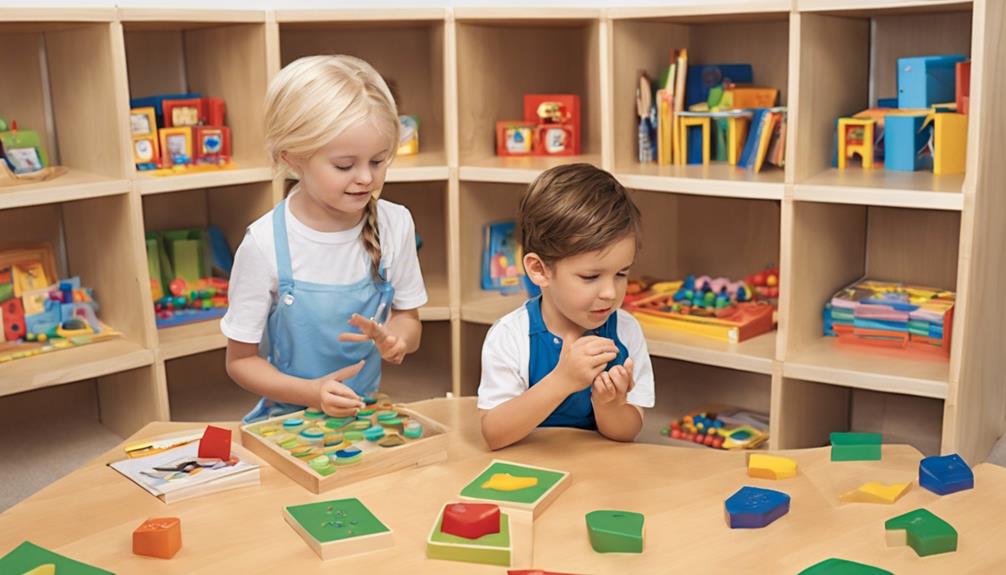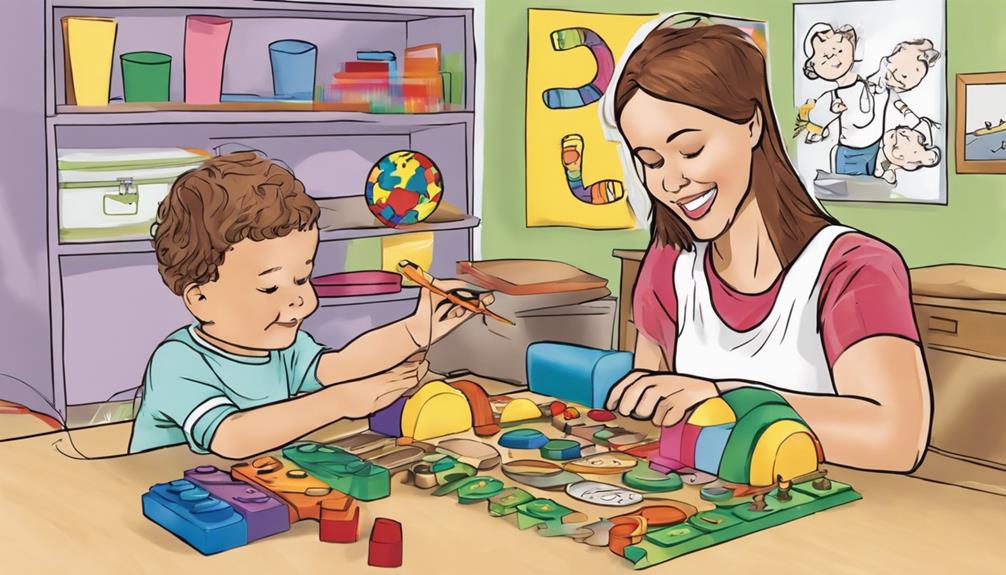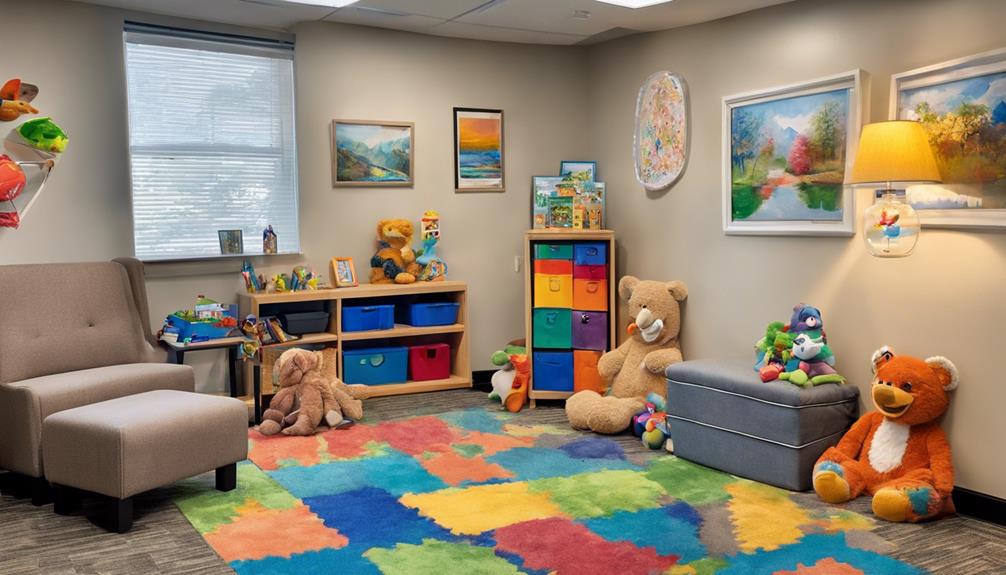As we delve into the world of speech therapy, we are surrounded by a variety of auditory processing techniques. These methods are essential for improving communication skills, but a crucial question remains – how do these strategies really contribute to the progress of speech and language abilities?
Let's explore the intricacies of these 7 auditory processing strategies together, uncovering their significance in shaping the way individuals interact and express themselves in the world.
Key Takeaways
- Enhance auditory processing skills for improved speech therapy outcomes.
- Implement auditory memory enhancement techniques for better retention and recall.
- Focus on auditory sequencing and memory to boost communication skills.
- Utilize multi-sensory integration methods for comprehensive auditory processing improvement.
Auditory Discrimination Techniques
In speech therapy, we employ auditory discrimination techniques to help individuals with auditory processing difficulties improve their ability to differentiate between sounds and speech aspects. Auditory discrimination plays a vital role in enhancing auditory processing skills, which are fundamental for language development and overall communication skills. By focusing on distinguishing subtle differences in auditory stimuli, such as sound matching activities, phonemic awareness tasks, and auditory processing games, individuals can refine their speech perception and language comprehension.
These techniques are designed to target specific auditory processing deficits effectively. Through tailored auditory discrimination strategies, speech therapists can support individuals in honing their auditory processing skills, ultimately fostering better language development. By strengthening auditory discrimination abilities, individuals can improve their communication skills and better navigate the complexities of speech and language. In speech therapy, we prioritize the enhancement of auditory discrimination as a foundational step towards overall improved auditory processing and language proficiency.
Auditory Memory Enhancement Methods

Enhancing auditory memory is a key focus in speech therapy, aiming to improve individuals' retention and recall of auditory information.
In speech therapy, we implement various auditory memory enhancement methods to help individuals process verbal instructions, conversations, and other auditory stimuli more effectively. Techniques such as chunking information, rehearsal strategies, and mnemonic devices play a crucial role in enhancing auditory memory skills.
By utilizing visual aids, repetition, and multisensory approaches, we reinforce auditory memory during therapy sessions. These methods are personalized to meet each individual's needs, including tailored working memory exercises and practice activities to strengthen auditory memory capacity.
Our goal is to empower individuals to better retain and recall auditory information, ultimately improving their overall communication skills. By incorporating these diverse strategies, we strive to enhance auditory memory in a comprehensive and effective manner within the realm of speech therapy.
Auditory Sequencing Exercises
As we explore the topic of Auditory Sequencing Exercises, it's crucial to consider the significance of Sound Pattern Recognition and Listening Memory Tasks in improving auditory processing skills.
These exercises focus on ordering and recalling sounds or words in a specific sequence, aiding children with auditory processing disorder in comprehending instructions, grasping narratives, and enhancing memory retention.
Sound Pattern Recognition
Improving auditory pattern recognition through targeted sequencing exercises is a fundamental aspect of enhancing auditory processing skills in speech therapy. These activities play a crucial role in honing the ability to identify and organize sounds, aiding individuals with auditory processing challenges.
By engaging in auditory sequencing tasks like repeating sequences of sounds or words accurately, individuals can boost memory, attention, and overall processing of auditory information. These tailored exercises address specific auditory processing difficulties, ultimately leading to improved communication and language skills.
Through structured sound pattern recognition exercises, individuals can gradually enhance their auditory processing abilities, paving the way for more effective speech therapy outcomes.
Listening Memory Tasks
Building on the foundation of sound pattern recognition, we now shift our focus to the essential role of listening memory tasks in auditory sequencing exercises for enhancing auditory processing skills in speech therapy. When addressing auditory processing disorder, these exercises play a pivotal role in developing language comprehension and communication abilities.
- Enhancing Working Memory: Listening memory tasks challenge the child's working memory, improving their ability to store and recall auditory information effectively.
- Improving Attention: Through auditory sequencing exercises, children learn to focus on the sequence of sounds or words presented, enhancing their attention skills.
- Supporting Language Development: Speech therapists utilize these tasks to target specific auditory processing difficulties and support overall language development in children.
Environmental Noise Reduction Tips

To enhance focus on auditory tasks and reduce distractions in therapy sessions, utilizing noise-cancelling headphones or earplugs is recommended.
By incorporating sound-absorbing materials such as carpets, curtains, or acoustic panels in therapy rooms, reverberations can be minimized, leading to improved speech perception.
Optimal lighting conditions play a crucial role in creating a comfortable and visually clear environment that supports auditory processing during speech therapy sessions.
Visual aids and cues can be strategically used to supplement auditory information, aiding individuals with auditory processing difficulties in comprehension.
Additionally, considering the use of teacher microphones or amplification systems can enhance speech clarity and help overcome background noise challenges in therapy settings.
Multi-Sensory Integration Approaches

Incorporating multi-sensory integration approaches in speech therapy sessions can significantly enhance auditory processing skills by engaging various senses to reinforce auditory input. When working with individuals experiencing auditory processing difficulties, utilizing multi-sensory techniques can make a remarkable difference in their progress.
Here are some strategies we employ to create a comprehensive and engaging experience for our clients:
- Visual Cues: Incorporating visual aids alongside auditory stimuli can help reinforce understanding and retention.
- Tactile Materials: Using hands-on materials can enhance learning by providing a physical connection to the auditory information.
- Movement Exercises: Engaging in movement activities while processing auditory stimuli can stimulate different parts of the brain, aiding in better comprehension and memory retention.
Technology Integration for Auditory Training

Utilizing innovative technology enhances auditory training in speech therapy by offering interactive exercises tailored to individual needs. Technology integration plays a crucial role in improving auditory processing skills through various tools such as speech therapy apps, virtual reality experiences, and computer-assisted programs. These digital resources can enhance sound discrimination abilities and overall auditory processing capabilities.
Speech therapy apps and software provide a convenient platform for individuals to engage in customizable auditory exercises, making the training process more effective and engaging. Virtual reality technology offers immersive experiences that can simulate real-life auditory environments, helping individuals improve their ability to process different sounds accurately.
Progress Monitoring and Adjustment Strategies

As speech therapists, we understand the importance of tracking therapy progress, modifying techniques as needed, and closely monitoring our clients' responses.
By continuously assessing their auditory processing skills, we can tailor interventions to suit their individual needs.
This data-driven approach allows us to optimize therapy outcomes and support children with auditory processing challenges effectively.
Track Therapy Progress
We track therapy progress by setting specific goals and objectives related to auditory processing skills to monitor improvements effectively. Utilizing standardized assessment tools, we measure changes in auditory processing abilities quantitatively.
Regularly reviewing therapy outcomes allows us to ensure the effectiveness of the interventions and make any necessary adjustments promptly. Documenting observed changes in auditory processing performance helps us tailor therapy strategies to meet individual needs accurately.
Involving the child, parents, and other professionals in monitoring progress fosters a collaborative approach to therapy. This inclusive process ensures that everyone is on the same page regarding the progress and allows for adjustments to be made efficiently.
Modify Techniques as Needed
Monitoring progress in speech therapy involves continuously assessing the child's auditory processing improvements and adjusting techniques accordingly to address their evolving needs effectively.
As therapists, we understand the importance of staying attuned to the changes in auditory processing abilities to tailor therapy techniques for optimal outcomes.
By incorporating flexibility into our approaches, we can ensure that the interventions are personalized and responsive to the child's specific challenges.
Regular progress monitoring allows us to identify areas where the child is excelling and where they may need additional support, guiding us in making necessary adjustments to therapy techniques.
This adaptability is crucial in helping children with auditory processing difficulties reach their communication goals successfully.
Monitor Client Response
How can progress monitoring and adjustment strategies enhance the effectiveness of auditory processing therapy interventions for our clients?
Monitoring client response is crucial for refining therapy approaches and improving communication skills.
Here are three key ways progress monitoring benefits our clients:
- Tracking client progress in auditory processing skills.
- Tailoring therapy goals based on regular assessments of communication abilities.
- Modifying treatment strategies and techniques to address individual needs effectively.
Frequently Asked Questions
How to Treat Auditory Processing Disorder in Speech Therapy?
In treating auditory processing disorder in speech therapy, we focus on improving sound distinction, memory, and sequencing skills crucial for effective communication.
Our treatment involves tailored auditory training, compensatory strategies, and environmental modifications. We utilize evidence-based practices to enhance auditory processing through engaging activities.
The goal is to help individuals better understand and analyze auditory input, improve focus and listening skills, and provide strategies for success in various settings.
What Are the Intervention Strategies for Auditory Processing Disorder?
Intervention strategies for Auditory Processing Disorder encompass auditory training, compensatory techniques, and environmental modifications. These methods aim to enhance sound discrimination, understanding, and communication effectiveness.
What Is the Role of SLP in Auditory Processing Disorder?
In addressing Auditory Processing Disorder, Speech-Language Pathologists (SLPs) play a critical role. They assess auditory processing skills, design tailored therapy plans, and collaborate with audiologists and other professionals.
What Are the Four Basic Skills Involved in Auditory Processing?
We understand the importance of auditory processing and the skills it involves.
Auditory discrimination, memory, sequencing, and attention are fundamental for effective auditory processing. Discrimination helps differentiate sounds, memory involves remembering auditory information, sequencing organizes sound order, and attention focuses on crucial auditory stimuli.
These skills are essential for language development and communication. Strengthening these abilities can significantly enhance auditory processing and speech therapy outcomes.
Are Strategies for Auditory Processing Helpful in Treating Auditory Hallucinations?
When it comes to treating auditory hallucinations, therapy techniques that focus on auditory processing can be highly beneficial. By utilizing specific strategies for auditory processing, individuals experiencing auditory hallucinations can learn to better understand and manage their perception of sound, leading to improved overall mental well-being.
Conclusion
In conclusion, by incorporating these 7 auditory processing strategies into speech therapy sessions, we can help individuals enhance their auditory skills and improve their communication abilities.
Just as a conductor orchestrates a symphony, speech therapists guide individuals through the complexities of auditory processing, helping them navigate the sounds of speech with clarity and precision.
Together, we can create harmonious communication experiences that empower individuals to confidently engage in conversations and connect with others.











